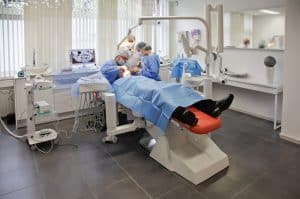What Is Dental Surgery?

In some cases, problems with your teeth require dental surgery. Many patients worry about pain and discomfort during their procedure. When you have dental surgery, numbing agents and dental sedation will be used to make you more comfortable during the procedure. Afterwards, you may only need over-the-counter pain killers while you recover. As serious as surgery can be, a good dentist wants to make it as pain-free as possible.
Table of Contents
Common Types of Dental Surgery

What to Expect Before Dental Surgery
You will likely receive special instructions to follow in order to prepare for your procedure. For example, your dentist may tell you to avoid eating or drinking for a certain number of hours before your procedure. This is common if you’re going to be under sedation or general anesthesia. You should also let your dentist know about any medications you take or any medical conditions you have beforehand. Your dentist may advise you to stop taking certain medications before your procedure. If you have a medical condition, you may need to take medication before surgery to lower your risk of complications.
Sedation Dentistry for Surgery

Sedation dentistry helps you receive the dental care you need instead of delaying due to anxiety. The use of this medication can also help you stay calm, which makes it easier for your dentist to perform surgery. If you want to explore dental sedation as an option, your dentist will go through your medical history to make sure you’re a good candidate. Most patients can be safely sedated for dental procedures, except for those with certain medical conditions.
What to Expect During Dental Surgery
During dental surgery, you shouldn’t feel any pain — only pressure and the movement of the tools — depending on the level of sedation you choose. Depending on certain factors, such as the type of procedure you’re having, you can expect to have local anesthesia, general anesthesia or sedation. If you’re under sedation or general anesthesia, your dentist will monitor your vitals, including your heart rate, throughout your procedure.
The amount of time you need to stay at the dentist’s office will depend on the complexity of your procedure and the type of anesthesia or dental sedation used. For minor procedures, you should be able to leave shortly after and drive yourself. Your mouth will take awhile to get feeling back. If you have general anesthesia or sedation, you will need to remain at the office until you’re fully awake and alert. Someone will need to drive you home and stay with you until the medication wears off.
What to Expect After Dental Surgery
After a dental procedure, you will receive instructions on follow-up care. You might need to watch what you eat and drink or take steps to avoid complications, such as infections or a dry socket. Your dentist will also recommend taking an over-the-counter pain reliever if you experience any soreness after your procedure. This side effect of surgery is usually mild and often lasts a few days.
Conclusion
If you need dental surgery in Mesa or Phoenix or you’re nervous about any dental procedure, contact our office today. We offer sedation dentistry to make your experience during routine exams and dental surgery as comfortable as possible. When you’re at ease and free of pain, you’re more likely to get the dental care you need. We’re here to help keep your teeth and gums as healthy as possible.

